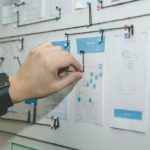The Optimal Morning Routine – Backed By Science & Tested By Millions
This article is going to be prescriptive and short. The morning routine I’ve adopted for the last six months from over eight years of testing, and the bulk of it has primarily been taken from Andrew Huberman’s work.
Here it is:
6.45 AM – On waking. Have a glass of water and use the bathroom.
6.50 AM – I leave a playlist called Get Up – (here it is publicly if you want it) on my iMac open. Ensure this is the only thing open on your desktop to avoid work or social distractions. I hit play. Hearing this at the same time each day reminds me of what I need to do and keeps me motivated when I feel too exhausted from a previously tough day or poor sleep.
Some science shows dopamine (our happiness hormone increases) when hearing certain music. Here is a snippet of how music can do this from Dr. Valorie Salimpoor on how this helps:
“In one study we found that when people listen to intensely emotional music they actually release dopamine in deep subcortical circuits that are phylogenetically ancient and have evolved to reinforce highly adaptive behaviour like eating and sex. Interestingly, people not only release dopamine at the peak pleasure moments in music, but also in anticipation of these moments. This makes sense when we think about the important role that anticipation plays in music appreciation. Music is really just a sequence of sounds organized into patterns over time. The temporal unfolding of sounds lead to the creation of expectancies, and their violation, confirmation, or delay of resolution, can lead to emotional arousal.”
The study she is referring to can be viewed here.
6.52 AM – Jump into the shower with warm water for one minute and then pull it around to cold for three minutes. This spikes our adrenaline and has a lasting effect on focus and concentration for up three hours. Towel off and get dressed.
“Deliberate cold exposure causes a significant release of adrenaline and noradrenaline in the brain and body. These make us feel alert and have a lasting effect after the shower, up to 90 – 180 minutes, improving focus and energy.”
This entire podcast reviews the literature and its application in day-to-day life via Dr. Andrew Huberman’s podcast. You can listen to it here.
7.00 AM – Take a brisk 10-minute walk around the block. The sun causes cortisol to rise, which is our wakefulness hormone, and exercise gives you another boost of adrenaline and cortisol.
Light is critical when setting our circadian clocks, as it releases the stress hormone cortisol, which acts as a “wake-up signal and will promote wakefulness and the ability to focus throughout the day,” per Huberman. Though cortisol has gained a bad reputation for its links to weight gain and various stress-related health issues, Huberman notes that this cortisol release will occur regardless. And so, waking up with the help of a few rays of sunshine channels it for good.
Here is just one study of many others talking about sunlight and exercise. This YouTube video dives into the science and explanation with some handy animations of Andrew Huberman’s morning routine.
7.15 AM – I follow a guided meditation for 10 minutes using the Waking Up app. The research and data from mindfulness activities correlate with improved concentration and focus.
“Research has shown that focused attention meditation not only improves our cognitive and motivational functioning (e.g., attention, mental health), it influences the way our brain networks [e.g., default mode network (DMN), fronto-parietal network (FPN), and sensory-motor network (SMN)] function and operates.”
This was taken from a 2020 paper and shows the structural changes that occur in the brain from some form of mindfulness practice.
7.20 AM – Throw on a 40HZ podcast (I use this link: https://open.spotify.com/episode/4P4AsFBh8f0O06tXRuGe7q?si=a80de38b88754fbc) for five minutes while I jump into my first task for the day.
“Low-frequency binaural beats are associated with mental relaxation and high frequency beats with alertness and attentional concentration (Vernon, 2009; Turow & Lane, 2011). This suggests that high-frequency beats might facilitate attentional control, which would fit with the observation that high-frequency neurofeedback training over the frontal cortex improves attentional efficiency (Keizer, Verment, & Hommel, 2010).”
This was taken from a 2017 paper that found more attentional focus through binaural beats.
8.15 AM – Have my first cup of coffee of black coffee. Our body needs roughly 90 – 120 minutes to reach its physiological peak, so I wait until this time. Caffeine artificially accelerates this window and is one of the things that contribute to the afternoon crash that we all experience.
This YouTube clip from Huberman Labs jumps into a summary of the topic.
10.30 – 11 AM – I will have my first meal.
If anyone has any other gems or edits they want to make to this morning routine, let me know. I’d love to hear how others kill it when they start their day.

